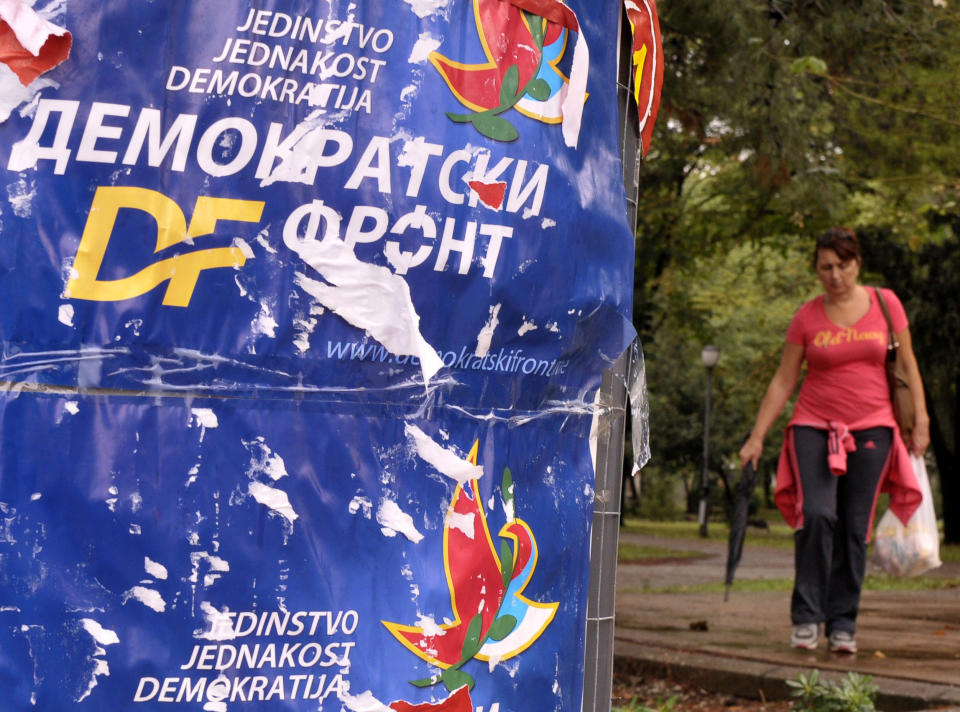Veteran pol expected to prevail in Montenegro vote
PODGORICA, Montenegro (AP) — A politician who has ruled Montenegro as president, prime minister and behind-the-scenes power broker could end up leading his country again, if the polls about this weekend's election are correct.
If Milo Djukanovic and his coalition prevail, he could serve as this tiny Balkan nation's prime minister again and continue its push for EU membership, despite an economic downturn.
This week's latest poll said Djukanovic's European Montenegro coalition is expected to win nearly half of the 81 seats in parliament in Sunday's vote, making it one of the few governments in Europe to survive a vote during the region's economic crisis.
The main opposition Democratic Front stands to gain some 20 percent of the vote, according to the survey by the Podgorica-based Center for Democracy and Human Rights. The margin of error was 3 percent.
Djukanovic and his coalition have ruled Montenegro since the late 1980s, first in alliance with Serbia's strongman Slobodan Milosevic, then as his toughest opposition.
Montenegro is a small, mountainous country of 625,000 people in southeastern Europe with one coast on the Adriatic Sea.
Djukanovic, 50, served as its prime minister — the top job— and as president while steering Montenegro to independence from Serbia in 2006 and toward opening European Union accession talks this year.
Although he formally resigned and handed over the premiership to a crony in 2010, Djukanovic — the youngest prime minister in Europe at the age of 29 in 1991 — has continued to rule the country from behind the scenes and to remain at the helm of his Democratic Party of Socialists. He is widely expected to become prime minister again, if his coalition wins Sunday.
During campaigning, Djukanovic has played a nationalist card, urging Montenegro's more than half a million voters to let him cement the country's statehood and take it into the EU and NATO.
"The stakes are high," he told the voters at a recent rally. "After six years of independence, our statehood is still fragile and we still need to strengthen it. We can't give our country to those who were against its independence."
Milos Besic of the Center for Democracy and Human Rights said that "no doubt Djukanovic's popularity and charisma are still at a high level," despite the economic crisis and widespread accusations by opposition and some international groups that he and his family have been involved in corruption and links with organized crime.
Djukanovic has repeatedly rejected such allegations, including an investigation by Italian prosecutors who had suspected his government of a multimillion-dollar cigarette smuggling operation during international sanctions imposed on Milosevic-led Yugoslavia in the 1990s' because of the Serbian strongman's warmongering policies.
Djukanovic's most serious opponent this weekend is Miodrag Lekic, a former diplomat and an associate turned foe.
"By insisting on national and other divisions, Djukanovic has tried to avoid real problems," Lekic said, describing Montenegro as "a country of captured institutions, where some individuals and groups behave as if they were outside of the legal system."
Montenegro has faced an economic downturn following a boom in the first years after the independence. Currently, unemployment officially stands at more than 12 percent, while the average salary is around €480 ($622) per month.
In this week's progress report, the EU praised Montenegro's reforms, but added that more needs to be done to strengthen the rule of law, judicial independence and fight against crime and corruption.
Even though it lags far behind the ruling coalition, Lekic's Democratic Front hopes to forge a post-election coalition with smaller opposition groups to counter Djukanovic. The pro-Serb Socialist People's Party is slated to win nearly 15 percent of the vote, and a newcomer, Positive Montenegro, could garner about 10 percent.
____
Jovana Gec and Dusan Stojanovic from Belgrade, Serbia, contributed.


